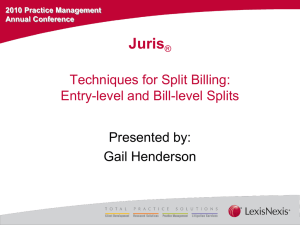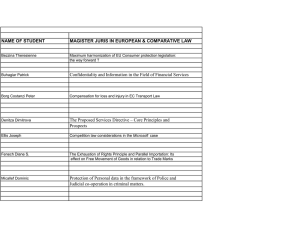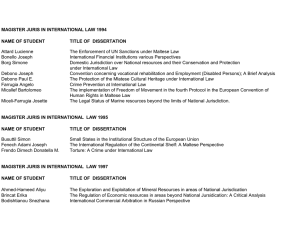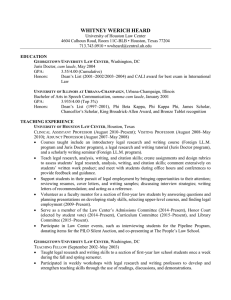Civ. Pro. Outline by Sarah Weiss Fall, 1999 Hershkoff, Civ. Pro
advertisement
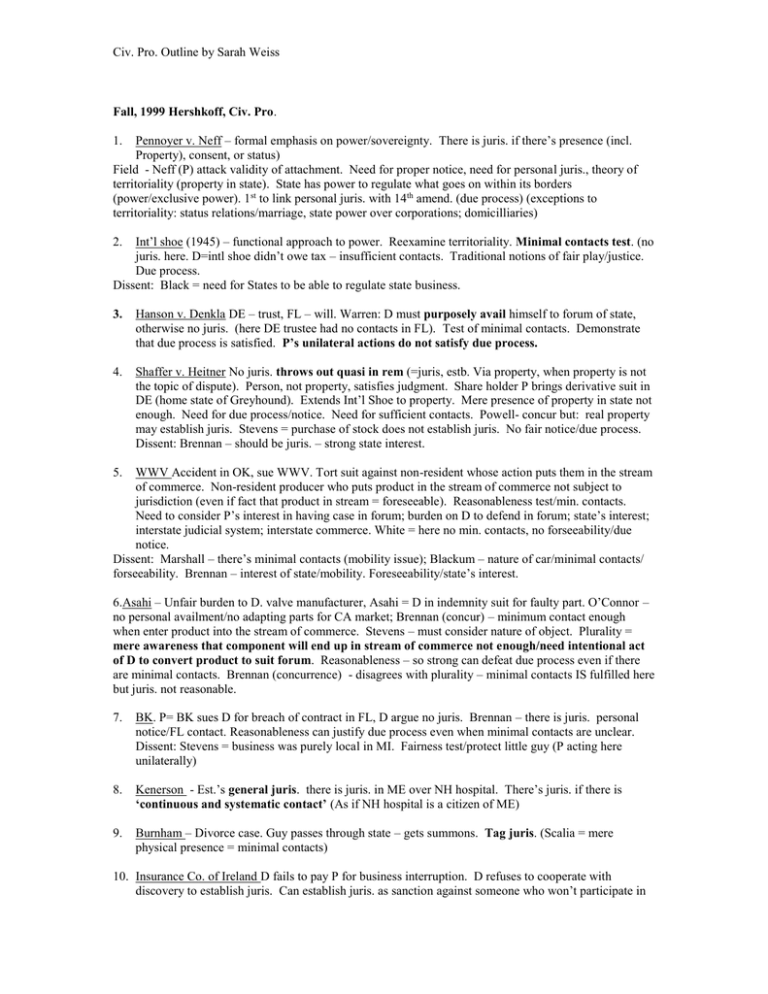
Civ. Pro. Outline by Sarah Weiss Fall, 1999 Hershkoff, Civ. Pro. Pennoyer v. Neff – formal emphasis on power/sovereignty. There is juris. if there’s presence (incl. Property), consent, or status) Field - Neff (P) attack validity of attachment. Need for proper notice, need for personal juris., theory of territoriality (property in state). State has power to regulate what goes on within its borders (power/exclusive power). 1st to link personal juris. with 14th amend. (due process) (exceptions to territoriality: status relations/marriage, state power over corporations; domicilliaries) 1. Int’l shoe (1945) – functional approach to power. Reexamine territoriality. Minimal contacts test. (no juris. here. D=intl shoe didn’t owe tax – insufficient contacts. Traditional notions of fair play/justice. Due process. Dissent: Black = need for States to be able to regulate state business. 2. 3. Hanson v. Denkla DE – trust, FL – will. Warren: D must purposely avail himself to forum of state, otherwise no juris. (here DE trustee had no contacts in FL). Test of minimal contacts. Demonstrate that due process is satisfied. P’s unilateral actions do not satisfy due process. 4. Shaffer v. Heitner No juris. throws out quasi in rem (=juris, estb. Via property, when property is not the topic of dispute). Person, not property, satisfies judgment. Share holder P brings derivative suit in DE (home state of Greyhound). Extends Int’l Shoe to property. Mere presence of property in state not enough. Need for due process/notice. Need for sufficient contacts. Powell- concur but: real property may establish juris. Stevens = purchase of stock does not establish juris. No fair notice/due process. Dissent: Brennan – should be juris. – strong state interest. 5. WWV Accident in OK, sue WWV. Tort suit against non-resident whose action puts them in the stream of commerce. Non-resident producer who puts product in the stream of commerce not subject to jurisdiction (even if fact that product in stream = foreseeable). Reasonableness test/min. contacts. Need to consider P’s interest in having case in forum; burden on D to defend in forum; state’s interest; interstate judicial system; interstate commerce. White = here no min. contacts, no forseeability/due notice. Dissent: Marshall – there’s minimal contacts (mobility issue); Blackum – nature of car/minimal contacts/ forseeability. Brennan – interest of state/mobility. Foreseeability/state’s interest. 6.Asahi – Unfair burden to D. valve manufacturer, Asahi = D in indemnity suit for faulty part. O’Connor – no personal availment/no adapting parts for CA market; Brennan (concur) – minimum contact enough when enter product into the stream of commerce. Stevens – must consider nature of object. Plurality = mere awareness that component will end up in stream of commerce not enough/need intentional act of D to convert product to suit forum. Reasonableness – so strong can defeat due process even if there are minimal contacts. Brennan (concurrence) - disagrees with plurality – minimal contacts IS fulfilled here but juris. not reasonable. 7. BK. P= BK sues D for breach of contract in FL, D argue no juris. Brennan – there is juris. personal notice/FL contact. Reasonableness can justify due process even when minimal contacts are unclear. Dissent: Stevens = business was purely local in MI. Fairness test/protect little guy (P acting here unilaterally) 8. Kenerson - Est.’s general juris. there is juris. in ME over NH hospital. There’s juris. if there is ‘continuous and systematic contact’ (As if NH hospital is a citizen of ME) 9. Burnham – Divorce case. Guy passes through state – gets summons. Tag juris. (Scalia = mere physical presence = minimal contacts) 10. Insurance Co. of Ireland D fails to pay P for business interruption. D refuses to cooperate with discovery to establish juris. Can establish juris. as sanction against someone who won’t participate in Civ. Pro. Outline by Sarah Weiss discovery/waivers 12b2 right to make special appearance. (est.’s waiver theory). Concurrence – Powell = must still estb. Minimal contacts to estb. Personal juris. over unconsenting D (fairness argument/constit.). R12h. 11. Carnival – was forum selection clause (FL) on back of ticket. D- cruise challenging P’s suit in another state. Court’s enforcement of forum selection (find for D – no juris.) Blackum = need for predictability, reasonableness (carnival based in FL/state interest/lim. scope). Dissent: Stevens and Marshall = was no consent. Need to protect weaker party. 12. Crocker – P raped @ D’s hotel in Barbados. P sues in MA. D’s challenge of personal juris. granted. No juris. Long arm statue applies to business in MA. Action of third party does not constitute P’s doing business in MA. No causation, no juris. 13. Mullane – constitutional challenge of notice. D pooled trust, notified P’s via paper. Need to choose best way to reach parties re: their rights. Notice by publication not sufficient when D has addresses. Need to seek better methods. 14. Piper – forum non-conveniens. Foreign P sue D= plane producer in US. Ct. rule Scotland is the proper forum. Need to consider witness availability, interests, convenience, burden of US courts. Is there an alternative forum, burden to D vs. burden to P, administrative feasibility. 15. Osborn – P says issue revolves around contract (state law). State tries to tax bank. Bank says its immune and tries to get an injunction to restrain tax collector, Osborn. article 3: Arising under. Marshall: there is fed. juris. when a constitutional question/federal issue is an ingredient of the case. (Here the bank was created by charter = fed. Statute – which gives it right to sue.) . Dissent: until federal issue comes up, there should be no federal juris. 16. Mottley – P sues RR for not honoring passes (breach of contract). D refuses to honor pass relying on an act of Congress. P tries to establish fed. juris. saying that fed. ques.’ll come up in D’s defense. Holding: No fed. Juris. Fed. Juris. can’t be based on mere anticipation of federal issue. (there is 1331 juris. only when the federal issue is the cause of action). Fed. juris. is based on P’s complaint (not D’s reply). P’s cause of action determines if it’s a federal issue or not. 17. Dow - P sues D =drug co. for injuries. D wants case in federal court. SC rules there’s no 1331 juris. Fed. law here doesn’t create cause of action to enforce the Fed. Drug Act. Insufficient gov’t interest to estb. 1331 juris. (also, P not US citizen, therefore not covered by fed. laws). Dissent: Brennan = argues that ruling should follow Osborn ingredient test/ argues for need of federal expertise. 18. American Well Works – P sues D for libel. D tries to argue that truth falls under patent law = fed. issue (i.e. P is infringing on D’s patent). But Fed. issues is only part of the defense. The law which created a cause of action here is state law (trade statue). No fed. juris when fed. issue is merely defense. (mere presence of fed. issue is insufficient) 19. Smith – P= shareholder, who tries to get injunction to prevent purchase of ‘unconstit. Securities.’ Here hold there is 1331 juris. due to nature of fed. issue. Employ Osborn test. Cause of action = breach of fiduciary duty (case turns on if bonds are constitutional = fed. issue). There is a clear federal interest in this case. Dissent: Holmes = isn’t SC review enough. This case falls under state law (stockholder trying to prevent co. from making investment) 20. Moore – RR worker injured bring action in district court since case falls under FELA and SAA (=fed. legislation). Case covered by state (KY), not federal law. No ‘arising under’ juris. 21. Mas – D look at P through 2 way mirror. D challenge diversity (P= resident but not domicilliary of LA. D=LA) Suit brought in fed. ct. based on diversity. Hold that there is diversity juris. Go acc. To where you are domiciliary. Civ. Pro. Outline by Sarah Weiss 22. Akenbrandt – Committed torts against kids. Fed. Dist. Ct. dismisses diversity suit P brings against her ex for abusing the kids because the case was within domestic relations. Here court rules there is diversity juris. over abuse cases (just not divorce cases). There is no ‘domestic relations’ exception here. 23. Amount – each distinct P must have separate claims of minimum amount (can aggregate individual P’s claims, but not groups) 24. Gibbs – P allege conspiracy under state and fed. law (D prevented him from working). Dist. Ct. dismisses fed. claim, but sustains damage based on state law. There is pendent jurisdiction whenever there is an ‘arising under’ claim. (need common nucleus of facts) 25. Dred Scot – can be citizen of US and not citizen of any state. No diversity judgment. 26. Aldinger – based on 1331 P sues state of fed. civil rights statue (1983). At time 1983 only could be filed against the state (not the city). Court doesn’t allow P to bring in 2 nd D = city on tort even though same nucleus of facts. No juris. – can’t add pendant party due to specific nature of statute. 27. Zahn and Hur Other P’s (even unnamed_ need requisite amount to satisfy subject matter juris. (need requisite amount even for unnamed parties). 28. Finley – P sue D for wrongful death due to faulty lighting (state claim). Then sue federal agency. Rule can’t add federal agency. SC refuses to allow supplemental juris. over pendant parties unless fed. statue specifically allows P to add a pendant party on a state claim. (Later overruled by 1367 (a)) 29. Owen – P(IA) sues OPPD and Owen for wrongful death of husband. Summary judgment for OPPD. Error - no diversity – Owen = IA business. No fed. juris – no diversity and state issue. Need each D to be different from each P. Can’t sustain P’s claim against Owen (1367b) 30. 1367 – a) re: 1331. Test = Gibbs – is there a common nucleus of facts. B) re: 1332. Codifies Owen. Can’t add other parties if they ruin diversity.
